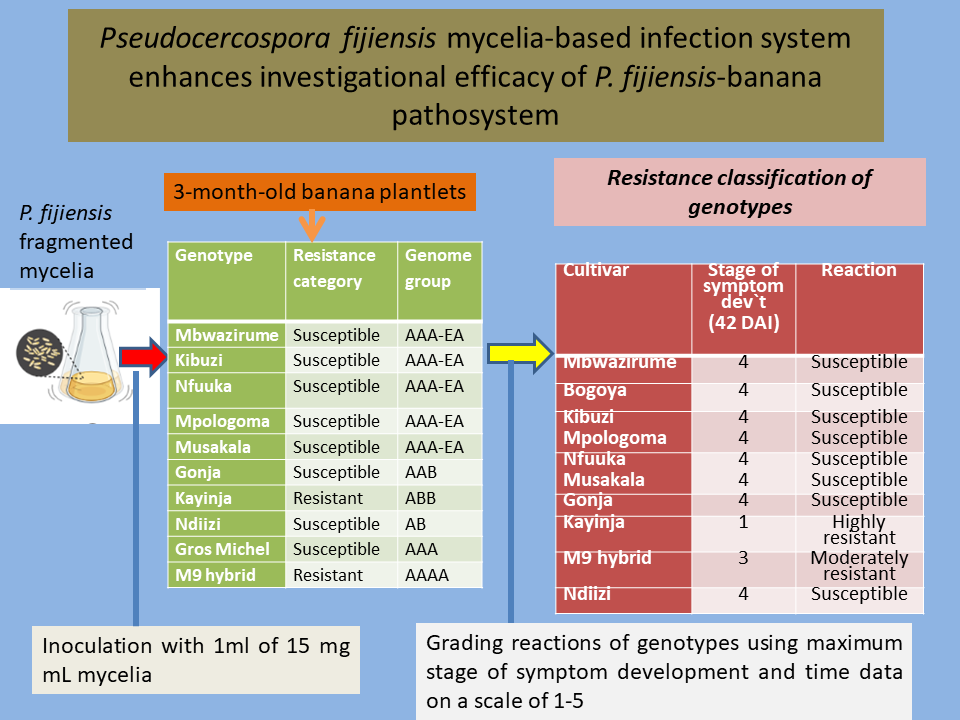Pseudocercospora fijiensis mycelia-based infection system enhances investigational efficacy of P. fijiensis-banana pathosystem
DOI:
https://doi.org/10.14295/bjs.v3i2.485Keywords:
Psedocercospora fijiensis, fragmented mycelia, banana genotypes, severityAbstract
Screening procedures for black Sigatoka have limitations. Thus, there is need for alternative screening procedure. A robust controlled-environment methodology for testing reaction of banana genotypes to Pseudocercospora fijiensis is, thus, still required. The objective of this study was, therefore, to assess the effect of P. fijiensis fragmented mycelia-based inoculum on black Sigatoka development in banana under screen house conditions with the view of developing a procedure for early assessment of resistance. Black Sigatoka severity increased significantly (P < 0.05) over time in all genotypes apart from Kayinja. Significant differences (P < 0.05) in severity were also recorded among the genotypes at 3, 4, 5 and 6 weeks after inoculation. All east African highland banana and plantain genotypes tested exhibited susceptible reaction, characterized by rapid progression of symptoms to necrotic lesions. Kayinja and M9 hybrids exhibited resistant reactions, characterized by small necrotic specks and chlorotic or brown blotches, respectively. The fragmented mycelia-based infection system classified the banana genotypes into resistant and susceptible clones, making it a reliable and efficient infection technique to assess black Sigatoka disease damage. The infection system is recommended for early screening for black Sigatoka resistance.
References
Arango, I. R. E., Diaz-Trujillo, C., Dhillon, B., Aerts, A., Carlier, J., & Crane, C. F. (2016). Combating a global threat to a clonal crop: banana black Sigatoka pathogen Pseudocercospora fijiensis (synonym Mycosphaerella fijiensis) genomes reveal clues for disease control. PLoS Genetics, 12(8), 432-441. https://doi.org/10.1371/journal.pgen.1005876 DOI: https://doi.org/10.1371/journal.pgen.1006365
Alvarez, E., & Cuellar, A. (2010). Evaluating the resistance of plantain and banana genotypes to Black Sigatoka (Mycosphaerella fijiensis) under greenhouse conditions. American Phytopathology Society Annual Meeting. Celebrated in August 7-11. Available in: http://www.apsnet.org/meetings/ Documents/2010_Meeting_Abstracts/ a10ma27.htm. Access in: December 22, 2023.
Balint-Kurti, P. J., May, G. D., & Churchill, A. C. L. (2001). Development of a transformation system for Mycosphaerella pathogens of banana: a tool for the study of host/pathogen interactions. FEMS Microbiology Letters, 195(1), 9-15. https://doi.org/10.1111/j.1574-6968.2001.tb10490.x DOI: https://doi.org/10.1111/j.1574-6968.2001.tb10490.x
Batte, M., Swennen, R., Uwimana, B., Akech, V., Brown, A., Tumuhimbise, R., Hovmalm, H. P., Geleta, M., & Ortiz, R. (2019). Crossbreeding East African Highland Bananas: Lessons Learnt Relevant to the Botany of the Crop after 21 Years of Genetic Enhancement. Frontier in Plant Science, 81(10), 1-9. https://doi.org/10.3389/fpls.2019.00081 DOI: https://doi.org/10.3389/fpls.2019.00081
Churchill, A. C. L. (2011). Mycosphaerella fijiensis, the black leaf streak pathogen of banana: progress towards understanding pathogen biology and detection, disease development, and the challenges of control. Molecular Plant Pathology, 12(4), 307-328.https://doi.org/10.1111/j.1364-3703.2010.00672.x DOI: https://doi.org/10.1111/j.1364-3703.2010.00672.x
Fao. (2012). A holistic integrated management approach to control black sigatoka disease of banana caused by Mycosphaerella fijiensis. Technical Manual. Available in: https://www.fao.org/fileadmin/templates/agphome/documents/caribbeanspci/IntApproachBSDManagementLVP.pdf. Access in: December 22, 2023.
Fullerton, R. A., & Olsen, T. L. (1995). Pathogenic variability in Mycosphaerella fijiensis Morelet, the cause of Black Sigatoka in banana and plantain. New Zealand Journal of Crop and Horticultural Science, 23(1), 39-48. https://doi.org/10.1080/01140671.1995.9513866 DOI: https://doi.org/10.1080/01140671.1995.9513866
Kimunye, J. N., Were, E., Mussa, F., Mahuku, G., Tazuba, A., Jomanga, K., Viljoen, A., Swenne, R., & Muthoni, F. K. (2019). Distribution of Pseudocercospora species causing Sigatoka leaf diseases of banana in Uganda and Tanzania. Plant Pathology, 69 (1), 50-59. https://doi.org/10.1111/ppa.13105 DOI: https://doi.org/10.1111/ppa.13105
Madden, L. V., Hughes, G., & vanden Bosch, F. (2007). The study of plant disease epidemics. American Phytopathological Society. St. Paul Minnesota, USA.
Nowakunda, K., Barekye, A., Ssali, R.T., Namaganda, J., Tushemereirwe, W. K., Nabulya, G., Erima, R., Akankwasa, K., Hilman, E., Batte, M., & Karamurat, D. (2015). 'Kiwangaazi' (syn 'KABANA 6H') Black Sigatoka, Nematode and Banana Weevil Tolerant 'Matooke' Hybrid Banana Released in Uganda. Horticulture Science, 50 (4), 621-623. http://hortsci.ashspublications.org/content/50/4/621.full.pdf DOI: https://doi.org/10.21273/HORTSCI.50.4.621
Ojiambo, P. S., Twizeyimanal, M., Tenkouano, A., & Bandyopadhyay, R. (2010). Rapid and mass screening of banana and plantain for resistance to Black sigatoka disease using detached leaf and in vitro plantlets. In: Mass screening techniques for selecting crops resistant to diseases (p. 91-100). Vielnla: International Atomic Energy Agency.
Paparu, P., Dubois, T., Coiney, D., & Viljoen, A. (2007). Defence-related gene expression in susceptible and tolerant bananas (Musa spp.) following inoculation with non-pathogenic Fusarium oxysporum endophytes and challenge with Radopholus similis. Physiological and Molecular Plant Pathathology, 71(4-6), 149-157. https://doi.org/10.1016/j.pmpp.2007.12.001 DOI: https://doi.org/10.1016/j.pmpp.2007.12.001
Tushemereirwe, W. K., Kangire, A., Kubiriba., J., & Nakyanjzi, M., & Gold, S. (2004). Field reaction of banana cultivars to Black Sigatoka in Uganda. African Crop Science Journal, 12(1), 19-26. DOI: https://doi.org/10.4314/acsj.v12i1.27658
Twizeyimana, M., Ojiambo, P. S., Tenkouano, A., Ikotun, T., & Bandyopadhyay, R. (2007). Rapid screening of Musa species for resistance to black leaf streak using in vitro plantlets in tubes and detached leaves. Plant Disease, 91(3), 308-314. https://doi.org/10.1094/PDIS-91-3-0308 DOI: https://doi.org/10.1094/PDIS-91-3-0308
Yonow, T., Villegas, J. R., Abadie, C., Darnell, R. E., Noboru, O., & Kriticos, D. J. (2019). Black Sigatoka in bananas: Ecoclimatic suitability and disease pressure assessments. PLoS One, 14(8), 21-35. https://doi.org/10.1371/journal.pone.0220601 DOI: https://doi.org/10.1371/journal.pone.0220601

Downloads
Published
How to Cite
Issue
Section
License
Copyright (c) 2024 Alfred Kumakech, Laban F. Turyagyenda, Richard Edema, Patrick Okori

This work is licensed under a Creative Commons Attribution 4.0 International License.
Authors who publish with this journal agree to the following terms:
1) Authors retain copyright and grant the journal right of first publication with the work simultaneously licensed under a Creative Commons Attribution License that allows others to share the work with an acknowledgement of the work's authorship and initial publication in this journal.
2) Authors are able to enter into separate, additional contractual arrangements for the non-exclusive distribution of the journal's published version of the work (e.g., post it to an institutional repository or publish it in a book), with an acknowledgement of its initial publication in this journal.
3) Authors are permitted and encouraged to post their work online (e.g., in institutional repositories or on their website) prior to and during the submission process, as it can lead to productive exchanges, as well as earlier and greater citation of published work.


